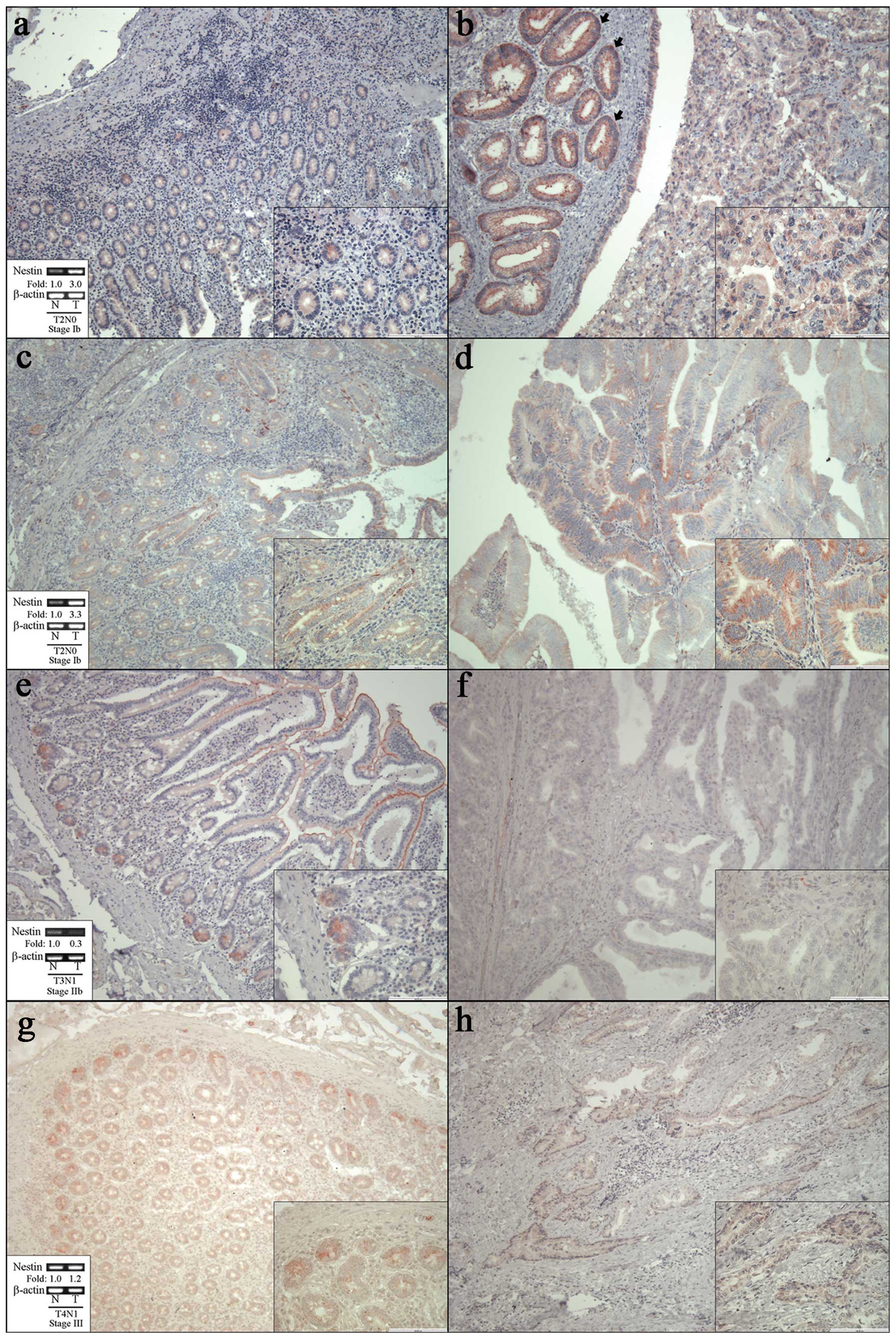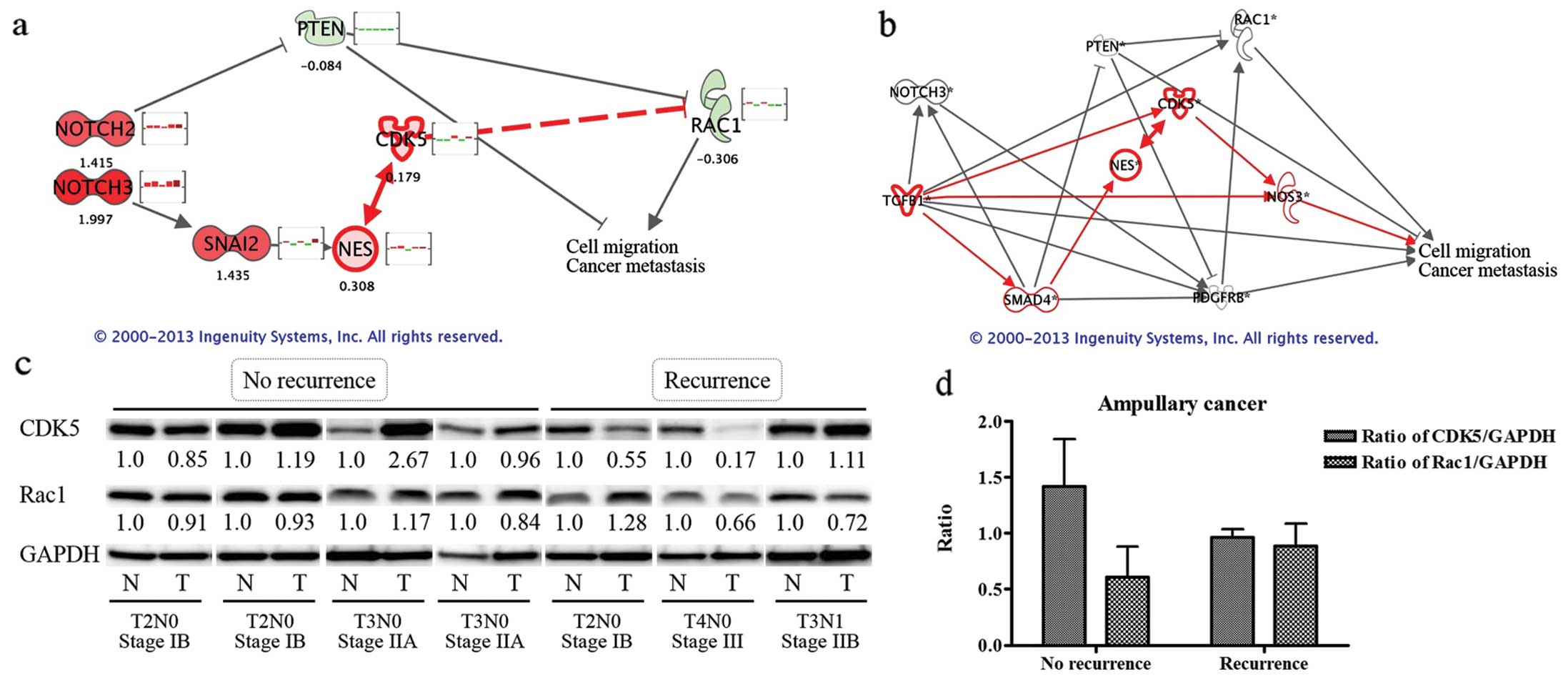|
1
|
O’connell JB, Maggard MA, Manunga J, et
al: Survival after resection of ampullary carcinoma: a national
population-based study. Ann Surg Oncol. 15:1820–1827. 2008.
View Article : Google Scholar
|
|
2
|
Jiang ZQ, Varadhachary G, Wang X, et al: A
retrospective study of ampullary adenocarcinomas: overall survival
and responsiveness to fluoropyrimidine-based chemotherapy. Ann
Oncol. 24:2349–2353. 2013. View Article : Google Scholar : PubMed/NCBI
|
|
3
|
Hsu HP, Shan YS, Hsieh YH, Yang TM and Lin
PW: Predictors of recurrence after pancreaticoduodenectomy in
ampullary cancer: comparison between non-, early and later
recurrence. J Formos Med Assoc. 106:432–443. 2007. View Article : Google Scholar : PubMed/NCBI
|
|
4
|
Shroff RT: Pathologic Markers of Prognosis
in Ampullary Carcinoma. 2012, UT GSBS Dissertations and Theses
(Open Access). Paper 246. http://digitalcommons.library.tmc.edu/utgsbs_dissertations/246/.
|
|
5
|
Hsu HP, Yang TM, Hsieh YH, Shan YS and Lin
PW: Predictors for patterns of failure after
pancreaticoduodenectomy in ampullary cancer. Ann Surg Oncol.
14:50–60. 2007. View Article : Google Scholar
|
|
6
|
Imai Y, Oda H, Tsurutani N, Nakatsuru Y,
Inoue T and Ishikawa T: Frequent somatic mutations of the APC and
p53 genes in sporadic ampullary carcinomas. Jpn J Cancer Res.
88:846–854. 1997. View Article : Google Scholar : PubMed/NCBI
|
|
7
|
Yamazaki K, Hanami K, Nagao T, Asoh A,
Sugano I and Ishida Y: Increased cyclin D1 expression in cancer of
the ampulla of Vater: relevance to nuclear beta catenin
accumulation and k-ras gene mutation. Mol Pathol. 56:336–341. 2003.
View Article : Google Scholar : PubMed/NCBI
|
|
8
|
Hsu HP, Shan YS, Jin YT, Lai MD and Lin
PW: Loss of E-cadherin and beta-catenin is correlated with poor
prognosis of ampullary neoplasms. J Surg Oncol. 101:356–362.
2010.PubMed/NCBI
|
|
9
|
Hsu HP, Shan YS, Lai MD and Lin PW:
Osteopontin-positive infiltrating tumor-associated macrophages in
bulky ampullary cancer predict survival. Cancer Biol Ther.
10:144–154. 2010. View Article : Google Scholar : PubMed/NCBI
|
|
10
|
Piscuoglio S, Lehmann FS, Zlobec I, et al:
Effect of EpCAM, CD44, CD133 and CD166 expression on patient
survival in tumours of the ampulla of Vater. J Clin Pathol.
65:140–145. 2012. View Article : Google Scholar
|
|
11
|
Visvader JE and Lindeman GJ: Cancer stem
cells in solid tumours: accumulating evidence and unresolved
questions. Nat Rev Cancer. 8:755–768. 2008. View Article : Google Scholar : PubMed/NCBI
|
|
12
|
Thiery JP: Epithelial-mesenchymal
transitions in tumour progression. Nat Rev Cancer. 2:442–454. 2002.
View Article : Google Scholar : PubMed/NCBI
|
|
13
|
Mani SA, Guo W, Liao MJ, et al: The
epithelial-mesenchymal transition generates cells with properties
of stem cells. Cell. 133:704–715. 2008. View Article : Google Scholar : PubMed/NCBI
|
|
14
|
Chen C, Wei Y, Hummel M, et al: Evidence
for epithelial-mesenchymal transition in cancer stem cells of head
and neck squamous cell carcinoma. PLoS One. 6:e164662011.
View Article : Google Scholar : PubMed/NCBI
|
|
15
|
Raimondi C, Gradilone A, Naso G, et al:
Epithelial-mesenchymal transition and stemness features in
circulating tumor cells from breast cancer patients. Breast Cancer
Res Treat. 130:449–455. 2011. View Article : Google Scholar : PubMed/NCBI
|
|
16
|
Chiou SH, Wang ML, Chou YT, et al:
Coexpression of Oct4 and Nanog enhances malignancy in lung
adenocarcinoma by inducing cancer stem cell-like properties and
epithelial-mesenchymal transdifferentiation. Cancer Res.
70:10433–10444. 2010. View Article : Google Scholar : PubMed/NCBI
|
|
17
|
Calabrese C, Poppleton H, Kocak M, et al:
A perivascular niche for brain tumor stem cells. Cancer Cell.
11:69–82. 2007. View Article : Google Scholar : PubMed/NCBI
|
|
18
|
Liu C, Chen B, Zhu J, et al: Clinical
implications for nestin protein expression in breast cancer. Cancer
Sci. 101:815–819. 2010. View Article : Google Scholar
|
|
19
|
Ryuge S, Sato Y, Wang GQ, et al:
Prognostic significance of nestin expression in resected non-small
cell lung cancer. Chest. 139:862–869. 2011. View Article : Google Scholar
|
|
20
|
Kawamoto M, Ishiwata T, Cho K, et al:
Nestin expression correlates with nerve and retroperitoneal tissue
invasion in pancreatic cancer. Hum Pathol. 40:189–198. 2009.
View Article : Google Scholar :
|
|
21
|
Remmele W and Schicketanz KH:
Immunohistochemical determination of estrogen and progesterone
receptor content in human breast cancer. Computer-assisted image
analysis (QIC score) vs. subjective grading (IRS). Pathol Res
Pract. 189:862–866. 1993. View Article : Google Scholar : PubMed/NCBI
|
|
22
|
Shih AH and Holland EC: Notch signaling
enhances nestin expression in gliomas. Neoplasia. 8:1072–1082.
2006. View Article : Google Scholar
|
|
23
|
Pallari HM, Lindqvista J, Torvaldsona E,
et al: Nestin as a regulator of Cdk5 in differentiating myoblasts.
Mol Biol Cell. 22:1539–1549. 2011. View Article : Google Scholar : PubMed/NCBI
|
|
24
|
Alexander K, Yang HS and Hinds PW:
Cellular senescence requires CDK5 repression of Rac1 activity. Mol
Cell Biol. 24:2808–2819. 2004. View Article : Google Scholar : PubMed/NCBI
|
|
25
|
Lee CH, Wei YW, Huang YT, et al: CDK5
phosphorylates eNOS at Ser-113 and regulates NO production. J Cell
Biochem. 110:112–117. 2010.PubMed/NCBI
|
|
26
|
Iwatsuki H and Suda M: Seven kinds of
intermediate filament networks in the cytoplasm of polarized cells:
structure and function. Acta Histochem Cytochem. 43:19–31. 2010.
View Article : Google Scholar : PubMed/NCBI
|
|
27
|
Chou YH, Khuon S, Herrmann H and Goldman
RD: Nestin promotes the phosphorylation-dependent disassembly of
vimentin intermediate filaments during mitosis. Mol Biol Cell.
14:1468–1478. 2003. View Article : Google Scholar : PubMed/NCBI
|
|
28
|
Kleeberger W, Bova GS, Nielsen ME, et al:
Roles for the stem cell associated intermediate filament Nestin in
prostate cancer migration and metastasis. Cancer Res. 67:9199–9206.
2007. View Article : Google Scholar : PubMed/NCBI
|
|
29
|
Su HT, Weng CC, Hsiao PJ, et al: Stem cell
marker nestin is critical for TGF-β1-mediated tumor progression in
pancreatic cancer. Mol Cancer Res. 11:768–779. 2013. View Article : Google Scholar : PubMed/NCBI
|
|
30
|
Patriarca C, Macchi RM, Marschner AK and
Mellstedt H: Epithelial cell adhesion molecule expression (CD326)
in cancer: A short review. Cancer Treat Rev. 38:68–75. 2012.
View Article : Google Scholar
|
|
31
|
Dhavan R and Tsai LH: A decade of CDK5.
Nat Rev Mol Cell Biol. 2:749–759. 2001. View Article : Google Scholar : PubMed/NCBI
|
|
32
|
Contreras-Vallejos E, Utreras E and
Gonzalez-Billault C: Going out of the brain: non-nervous system
physiological and pathological functions of Cdk5. Cell Signal.
24:44–52. 2012. View Article : Google Scholar
|
|
33
|
Feldmann G, Mishra A, Hong SM, et al:
Inhibiting the cyclin-dependent kinase CDK5 blocks pancreatic
cancer formation and progression through the suppression of Ras-Ral
signaling. Cancer Res. 70:4460–4469. 2010. View Article : Google Scholar : PubMed/NCBI
|
|
34
|
Myant KB, Cammareri P, McGhee EJ, et al:
ROS production and NF-κB activation triggered by RAC1 facilitate
WNT-driven intestinal stem cell proliferation and colorectal cancer
initiation. Cell Stem Cell. 12:761–773. 2013. View Article : Google Scholar : PubMed/NCBI
|
|
35
|
Yang WH, Lan HY, Huang CH, et al: RAC1
activation mediates Twist1-induced cancer cell migration. Nat Cell
Biol. 14:366–374. 2012. View Article : Google Scholar : PubMed/NCBI
|
|
36
|
Eggers JP, Grandgenett PM, Collisson EC,
et al: Cyclin-dependent kinase 5 is amplified and overexpressed in
pancreatic cancer and activated by mutant K-Ras. Clin Cancer Res.
17:6140–6150. 2011. View Article : Google Scholar : PubMed/NCBI
|
|
37
|
Bertrand FE, Angus CW, Partis WJ and
Sigounas G: Developmental pathways in colon cancer: crosstalk
between WNT, BMP, Hedgehog and Notch. Cell Cycle. 11:4344–4351.
2012. View Article : Google Scholar : PubMed/NCBI
|
|
38
|
Hu YY, Zheng MH, Cheng G, et al: Notch
signaling contributes to the maintenance of both normal neural stem
cells and patient-derived glioma stem cells. BMC Cancer. 11:822011.
View Article : Google Scholar : PubMed/NCBI
|

















